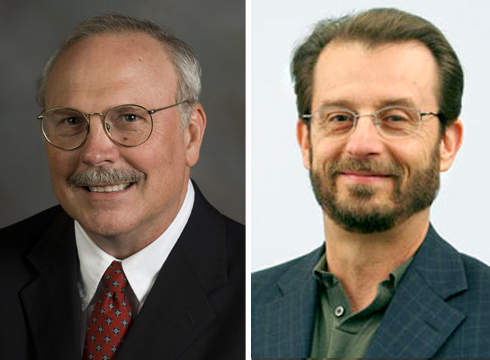Fralin Life Science Institute, Virginia Bioinformatics Institute reorganize to build efficiency, synergy

The Virginia Bioinformatics Institute and the Fralin Life Science Institute of Virginia Tech are working more closely to share resources and take advantage of research synergies, university officials announced this week.
In the new structure, life science researcher Dennis R. Dean, who had served as director of both the Virginia Bioinformatics Institute and the Fralin Life Science Institute, will continue as the director of the Fralin Life Science Institute, while the Virginia Bioinformatics Institute Scientific Director Christopher L. Barrett assumes executive director duties at the Virginia Bioinformatics Institute.
“We are extremely excited to have Dr. Barrett lead the way forward and grateful to Dr. Dean for his work directing the Virginia Bioinformatics Institute of Virginia Tech,” said Robert W. Walters, vice president for research. “Dr. Dean’s leadership at both [Virginia Bioinformatics Institute] and the Fralin Life Science Institute for the past two years has provided an excellent opportunity for us to assess and implement substantive integration of resources available to both institutes. Moving forward, my expectation is that Dr. Barrett and Dr. Dean will continue collaborating to increase operational efficiencies and maximize opportunities for the broad support of Virginia Tech faculty.”
Barrett served for more than 20 years at the Naval Air Development Center and the Los Alamos National Laboratory before establishing the Network Dynamics and Simulation Science Laboratory at Virginia Bioinformatics Institute and later becoming scientific director of the Virginia Bioinformatics Institute and director of the Virginia Bioinformatics Institute-National Capital Region.
“The partnership between [Virginia Bioinformatics Institute] and Fralin represents a constructive evolution of our growing research enterprise,” said Mark G. McNamee, senior vice president and provost. “The new assignments provide an opportunity for greater efficiency and effectiveness without altering the well-defined missions of each institute.”
Dean will continue to provide leadership for Virginia Tech’s life science community through the auspices of the Office of the Vice President for Research.
Janet Webster, associate director of the Fralin Life Science Institute, will take on the additional responsibilities of coordinating the communication, outreach, and educational missions for both institutes. Laurie Coble, the chief operating officer for Virginia Bioinformatics Institute, will take an active role in the operation of the Fralin Life Science Institute.
“Dr. Barrett has provided outstanding leadership to [Virginia Bioinformatics Institute[ and Virginia Tech by articulating a vision in the area of big data-driven ‘information biology' and I am delighted that he has accepted the opportunity to continue elevating the team science mission of [Virginia Bioinformatics Institute] by serving as its executive director,” Walters said.
Working closely with the Fralin Life Science Institute, Barrett will lead the Virginia Bioinformatics Institute in efforts to capitalize on team science, unravel the complexities of large-scale interacting systems, and build on the institute’s informatics and computational strengths and accomplishments.
“I am very much looking forward to the challenge of leading the Virginia Bioinformatics Institute,” Barrett said. “Working closely with Dr. Dean, the other institute directors, and the academic units, I am confident that, together, we can continue to aggressively grow Virginia Tech’s research portfolio in exciting and innovative ways.”
“Dr. Barrett and I have already started to implement a higher level of integration of [the two institutes],” Dean said. “These institutes are a vital part of our translational infrastructure at Virginia Tech. Their researchers create synergies internationally and with collaborators at our colleges and other university-level institutes and centers, which in turn enable us to meet global, state, and local challenges.”
Barrett has pioneered the application of high-performance computing and network science to socio-technical, behavioral, and biological science.
As the leader of the Network Dynamics and Simulation Science Laboratory group at Virginia Tech, Barrett has spurred the development and application of network theory and simulation toward useful applications for national security-related decision making, interdependent societal infrastructures, contagious disease and public health, biosystems analysis, and other complex systems.
The techniques are valuable to scientists, policymakers, and business leaders who need simulations to make practical decisions in complex scenarios that have a high degree of biological, social, and technical interaction.
Barrett has received distinguished research recognition from Chalmers University in Sweden, the Institute for Scientific Interchange in Italy, the Royal Institute of Technology in Sweden, the Swedish Royal Colloquium, SMART Infrastructure Facility in Australia, Los Alamos National Laboratory, the U.S. Navy, the Alliance for Transportation Research, Artificial Life and Robotics at Oita University in Japan, and others.
During his tenure at Virginia Tech, Barrett and the teams that report directly to him have won more than $60 million in extramural funding from agencies such as the Department of Defense, the Defense Threat Reduction Agency, the National Institutes of Health, and the National Science Foundation.
He received a master's degree in engineering science in 1983 and a Ph.D. in bioinformation systems from the California Institute of Technology in 1985.
Dean, the Stroobants Professor of Biotechnology and a University Distinguished Professor, has been a faculty member since 1985.
With an active research program focused on various aspects of the role of metals in health and disease, Dean has received continuous extramural research support since 1975, including awards from the U.S. Department of Agriculture, National Science Foundation, National Institutes of Health, the Office of Naval Research, and the Department of Energy.
Dean was recently elected as a Fellow of the American Association for the Advancement of Science and a Fellow of the American Academy of Microbiology for his contributions to microbiology and bioinorganic chemistry.
Dedicated to its motto, Ut Prosim (That I May Serve), Virginia Tech takes a hands-on, engaging approach to education, preparing scholars to be leaders in their fields and communities. As the commonwealth’s most comprehensive university and its leading research institution, Virginia Tech offers 240 undergraduate and graduate degree programs to more than 31,000 students and manages a research portfolio of $513 million. The university fulfills its land-grant mission of transforming knowledge to practice through technological leadership and by fueling economic growth and job creation locally, regionally, and across Virginia.








